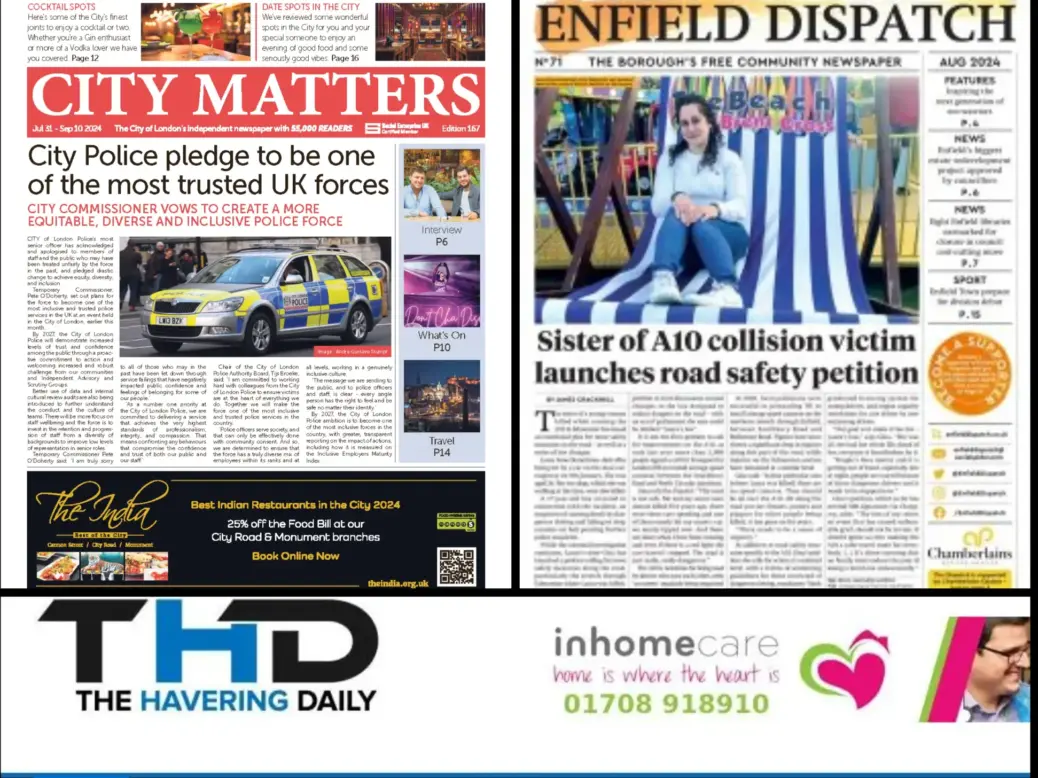
Press Gazette research has charted the retreat of legacy media publishers from London with large swathes of the UK capital now unreported.
But the good news is independent outlets are filling the gaps in some places. Press Gazette found out about three independent publishers who are making local news work in the Big Smoke.
Enfield Dispatch: A not-for-profit newspaper
James Cracknell is the editor-in-chief of Enfield Dispatch, a not-for-profit organisation that covers local affairs in the London borough of Enfield.
Its content ranges from features on local businesses to interviews with local politicians. The monthly free print title, with a distribution of 15,000, is supplement by daily online news.
But on the future prospects for the site, Cracknell tells Press Gazette: “I wouldn’t say [it is] near to closing, but it’s been difficult and it continues to be difficult right now.”
Explaing how the title was founded, he said: “We had two other newspapers, in Waltham Forest and Tottenham, and Enfield Dispatch would become our third paper.
“It was another year until we got to a place where we could launch it for Dispatch [in 2018], but we did that partly to try and fill at least part of the gap left by the previous newspaper, but also just because we believe in local media, the role that it plays in society, linking community groups together, highlighting injustice and inequality, holding power to account and all of the good things that a good newspaper should do.”
He added: “I think there’s a bit of a myth that because local newspapers have been in decline for 20 years and continue to decline, that the driver for that has been less demand for local news – I don’t think that’s the case.
“I think it’s more to do with the financial model behind local news which collapsed. You know, the old financial model which had been successful for local newspapers for 100 years or whatever – that model of local news in terms of financing it and indeed making profit from it because there were lots of profits that were able to be made by the big corporations.
“That model collapsed with the advent of the internet, social media and smartphones but also the big corporations that failed to adapt to it, so it was a failure on their part. I’m not excusing those corporations. They did make lots of mistakes in how they adapted to it, but fundamentally I believe the demand for local news is still there.”
When asked about his vision for the newspaper, he said: “What we’re trying to do is deliver what we think we believe to be good quality local news, a good quality local newspaper and a good quality local news website.
“And then in doing so, trying to figure out a way to make that work financially. And I would say that’s a work in progress because I can’t sit here and tell you I figured out how to make it work financially because we have a lot of debt.”
The reporting staff of the Enfield Dispatch comprises Cracknell himself and a share of a BBC Local Democracy Reporter who also covers news in two other London boroughs.
On the decision to remain free in print and online, Cracknell said: “I think trying to make a newspaper when you’re trying to get people to pay for it is very, very difficult. So we’ve taken that approach that we’re going be free.
“If we were to put a cover price on our newspaper, it would then suddenly exclude a lot of people from reading it. So we want people from all areas of society – we’ve got rich and poor areas in our borough – and we want everyone to be able to access the news that we produce…
“What sets us apart from the big corporate local newspapers is that we’re trying to produce as much journalism as we can with the resources that we have. Whereas [with big corporations], they are just trying to produce whatever profit that they can produce with as little journalism as possible. So we’re almost pretty much doing the opposite.”

He added: “We want to continue banging the local drum for local journalism, showing why it’s important, showing it is in demand, showing that it’s still possible to produce good local journalism and we’re just sort of living in hope that one day a government will come along – maybe next week? Maybe in four years, who knows? But a government that one day will come along that will recognise that local journalism plays a fundamental role in local democracy, democracy in general, and that it’s something worth supporting.”
The site is funded by a mixture of advertising (80%, with the majority in print) and donations.
In terms of making a profit, Cracknell said: “We’re a social enterprise and any profits we do make will be reinvested. We’ve got to a point where we are basically breaking even. It fluctuates a lot.
“The advertising is always very dependent on the health of the economy. So when the economy is struggling, advertising tends to go down. So it does go up and down a lot, but as of now, we’re month to month breaking even.”
“But the problem we have is that we accrued a lot of debt to get to where we are as a company. So we’ve now got these debts that we need to try and pay off and we’ll only be able to pay off if we’re able to make more money than what we’re spending.
“And we’re not making enough at the moment to be able to pay down our debts quickly enough, which is creating a huge financial strain on the whole company.”
The title turns over around £5,000 to £6,000 in revenue per month.
Havering Daily: Profitable local news website
Ross Elliot, who runs the Havering Daily, told Press Gazette his the title is funded by advertising, promoted articles, donations and merchandise sales.
It has two salaried reporters and also has input from community volunteers.
Elliott launched the title by partnering up with editor Francesca Lilleystone in 2019 “to fill the gap that was obviously there in Havering”. He said the local press at the time was a printed paper which “saved all their good stories for once a week, and news has moved on since”.
“If you look out your window, count how many people are holding a newspaper, then count how many people are holding a mobile phone – the news has changed”.

Elliott boasted that he can publish an article in just 60 seconds and relies on input from the community via:
- Social media DMs
- Email: newsdesk@thehaveringdaily.co.uk
- A community Whatsapp group
- Forms on The Havering Daily website
During Press Gazette’s interview with Elliott he received a Whatsapp message telling him about a fire in Havering. He advises anyone looking to start a local publication: “You’ve got to be prepared for the bad stuff. Good news – there’s not enough of it.”
He said he is “never short of news”. But the title is not just about news. He said: “The idea was that we created a platform where the everyday resident, or the people who might not have a platform or voice in the community, had one.”
The Havering Daily has sections including: politics, sport, opinion, food and cinema reviews. The primary focus on “breaking news, general community news, politics, and crime” is supplemented by whatever the residents wish to write about because, he said, “it’s their platform too”.
In addition, campaigning work by the Havering Daily includes:
- Litter picking
- Tree planting
- Supporting local charities
- Championing local businesses.
Elliot said: “We’re out here to do some good, and while we can, we will.”
City Matters: Monthly newspaper and website covering the Square Mile
Nick Chapman is co-founder of City Matters, a hyperlocal title which makes most of its money from the monthly print edition. He said: “Everything is going digital, but I think print is trusted… the stronger product is the newspaper.”
The title aims to reach the 9,000 mainly wealthy residents of the City of London, as well as the many tourists passing through the area.
Chapman said: “We know that if a resident hasn’t gotten their paper on the first Wednesday or Thursday they will quite often call up and say ‘what’s happened to the paper?’ People miss it if it’s not around.”
Revenue comes via advertising and sponsorship. Chapman said: “We are relying on the strength and the confidence of City of London businesses – be them the small chiropractor, florist, or a big insurance company.”
The title can be picked up for free at 30 London Underground and mainline railway stations, the Royal Exchange, and other locations in central London including restaurants, hotels, bars, cafes, and We Work share office spaces.
There are five members of staff and Chapman said “most months we’re running a small profit”.
He said: “We spend a reasonable amount on the printing of the product. It’s a very high quality improved paper stock.
“If I had a lot more money, there’s an awful lot more things I could do, because I’ve got opportunities to expand our distribution.”
City Matters covers local news in its 24 pages and also has a cryptocurrency page.
Chapman said: “We’re not talking about interest rates, we don’t have that sort of expertise. We are very much lifestyle.”
City Matters also includes content on property, what’s on, restaurant reviews, shopping, wellness and even celebrity interviews (Alexa Chung, Gino D’Acampo and Sara Pascoe, to name a few). The core of the paper is “what do wealthy residents and workers spend their money on?”
On the title’s editorial approach, Chapman said: “You basically go out there and visit these places… it’s old school”.
Chapman began his career at The Times titles and The Sun selling advertising in the late 1990s and started City Matters in 2016.
He said: “I went into this City of London corporation and told them we’re launching this new newspaper. They basically came back to me and said ‘if you’re here in a year, come and have a chat with us’”.
Chapman added: “It was quite easy to be Nick Chapman of The Sunday Times in the early 2000s because we had an awful lot of power.
“I don’t have all the huge resources to back up, to lean on – we’re a microbusiness.
“It has its moments, it’s not for the faint-hearted… It’s the appeal of the sense of satisfaction, there’s a sense of supporting the City.”
Email pged@pressgazette.co.uk to point out mistakes, provide story tips or send in a letter for publication on our "Letters Page" blog
